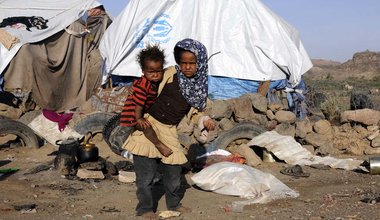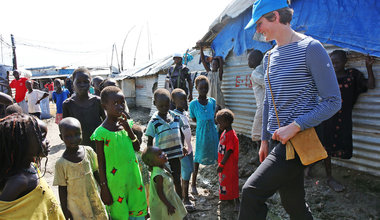Protection of migrant and refugee children must be at core of new global compacts – UN agency
 Amid ongoing discussions towards the first-ever global compacts on refugees and migration, the International Organization for Migration (IOM) joined other United Nations agencies meeting in Berlin today stressing that all parties involved in these talks must work together to address the needs of migrant children, consistent with their human rights.
Amid ongoing discussions towards the first-ever global compacts on refugees and migration, the International Organization for Migration (IOM) joined other United Nations agencies meeting in Berlin today stressing that all parties involved in these talks must work together to address the needs of migrant children, consistent with their human rights.
“Every day at [IOM], we work with migrant children. Some have been compelled to move accompanied by relatives or guardians or on their own due to conflict, disasters, fear and despair,” said William Lacy Swing, IOM Director General, when discussing preparations for the Global Conference on Children on the Move.
He explained that other children migrate in search of better socio-educational opportunities and ultimately to pursue their own development and that of the society they live in.
With more than 250 participants from States, civil society, academia, UN agencies, private sector and individual experts, the conference takes into account children's priorities and concerns, with the aim of assuring separate global compacts covering migrants and refugees.
“We want to ensure that child migration is always in the best interests of the child and that when it is not, sustainable solutions are found for children and their families both at home or in a new home elsewhere. These solutions should ensure that children are not left behind and that they are not exploited or even worse: trafficked. All migrant children are entitled to care and protection regardless of their migratory status,” concluded Mr. Swing.
In the New York Declaration Refugees and Migrants, adopted in September 2016, the UN General Assembly decided to develop a global compact for safe, orderly and regular migration. The process to develop this global compact for migration started in April 2017. The Assembly will then hold an intergovernmental conference on international migration in 2018 with a view to adopting the global compact.
Different factors contribute to migrant children's situations of vulnerability, including their age, risk factors at individual, household, community and structural levels, the reasons why they have migrated, and the conditions they face during travel, transit, and at destination.
IOM underscores that it will continue to strive for migrant children's wellbeing and best interests across the wide spectrum of activities the Organization is pursuing in support to all Governments, who are ultimately responsible for their protection.
The UN migration agency values this inclusive partnership and its goals, especially as the consultations progress for the global compact on safe, orderly and regular migration – a major global process, to which IOM is extending technical and policy expertise as requested by UN Member States.
 UN
UN







